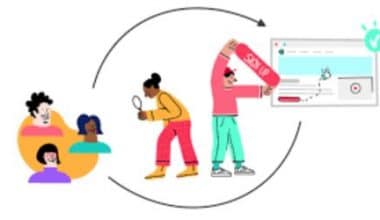Session Initiation Protocol (SIP) has quickly become a hot topic among IT departments and businesses looking to expand their phone service beyond a single location. Companies are switching to cloud phone services to better equip their employees with the tools they need to communicate efficiently and effectively in the hybrid workplace. Simply put, SIP phones are one of the most cost-effective options for businesses. Here, we’ll break down what you should know about a SIP phone, including an analysis of the whole system, the service, the software you can use, and a clear comparison between SIP and IP phones.
What Is Session Initiation Protocol (SIP)?
SIP is a sophisticated communications protocol that is widely used for managing multimedia communications such as video calls and voice calls. This SIP functions as a type of VoIP phone call service, allowing internet calls to be routed instead of traditional phone service.
SIP is a set of rules that allows an IP address to be used to initiate a communication session, which can be a voice call between two people or multiple participants. SIP technology enables businesses to diversify into other modes of communication, such as messaging and video conferencing.
What are SIP phones?
A SIP Phone service is simply a phone that uses the Open Standard “SIP” to set up and manage phone calls. The actual voice is transmitted over an IP-based network using yet another Open Standard known as “RTP.” Because these protocols are referred to as “VoIP” (voice-over-internet-protocol), these phones are also known as VoIP Phone service or VoIP Clients.
SIP phones are divided into two categories:
- Hardphones or Deskphones or Hardware SIP Phones.
- Softphones or Software SIP Phones.
How Does SIP Phone Work?
SIP phones are controlled by simple commands. The network traffic between SIP devices resembles how we access web pages via HTTP. While the technical specifications can become complicated, there is good news: the average user does not need to do anything with these commands—the SIP phone service handles them automatically.
When you make a call from a SIP phone, it notifies the server to which it is connected, such as your company’s VoIP service. Following that, the server routes the call to the Public Switched Telephone Network and connects the call when the other party answers on their end.
Features of SIP Phones
SIP phones appear to be ordinary office phones, but they provide far more functionality when it comes to calling management. A SIP phone system can place users on hold and transfer them to other extensions in addition to making phone calls. They also outperform traditional office phones in terms of call quality.
The functions provided by SIP phones are provided from the back end, which is one of the reasons why many IT leaders are interested in the technology. SIP phones can connect to your VoIP service without the use of any additional hardware or servers, and because they do not use traditional phone lines, they are much less expensive to maintain.
The following are the most important features of SIP phones:
- Advanced call forwarding
- Hold (with or without music)
- Conference calling
- Auto-attendant
- Shared call appearance
- Mobile & desktop app integration
- HD phone calls
- Call recording
- Customer caller ID
Types of SIP Phones
The SIP phone system is divided into two types: hard phones and softphones. Both options provide superior performance over traditional phones, as well as numerous distinct advantages. SIP phones are only compatible with the cloud-based phone system.
#1. Hardphones
These phones, also known as desk phones, speakerphones, or hardware SIP phones, are built with IP components and connect to an IP network via Wi-Fi or ethernet cables. Hard phones, which typically include a display, have the same visualization and feel as a traditional desk phone, with the exception that calls are made over IP networks rather than traditional phone lines.
Hard phones are classified according to their functions:
Basic: As the name suggests, a basic hardphone has the functionality to make and receive internal and external business phone calls.
Intermediate: Featuring more extensions than the basic category of hardphones, intermediate SIP phones offer businesses more options for making phone calls.
Advanced: Featuring multiple extensions and Wi-Fi compatibility, advanced hardphones often have an integrated camera for video call functions.
#2. Softphones
Softphones, also known as calling software or VoIP apps, provide phone service via software that is installed on a laptop, desktop, or mobile phone. In order to begin making and receiving calls, it is usually as simple as installing a VoIP app and connecting a headset and microphone. In a business setting, softphones can be installed by system administrators or by users themselves via a self-service format. Using softphone technology in large offices necessitates a careful examination of the network’s utilization by the IT department.
SIP softphone traffic cannot be distinguished as easily as other network applications. Companies that use mandatory VPNs, for example, should perform a VoIP speed test to evaluate their connection before switching to softphones.
When using VoIP, the call quality adapts to network changes such as limited bandwidth. Additionally, using softphone features on your mobile phone all day will most likely result in shorter battery life, implying that IT leaders must plan ahead of time if they want to deploy softphone apps to employees.
Best Free SIP Softphone Software to Use
You can use a variety of free SIP phone softphone software system to improve the performance of your computer, including:
#1. LiveAgent
LiveAgent is a good SIP phone software and also a comprehensive help desk solution that includes softphone software. It employs softphone technologies to enable call center agents to provide superior customer service during phone calls. Without the need for expensive physical hardware, LiveAgent’s multi-channel customer care software provides key features. However, they include VoIP softphone, ticketing, instant messaging, video calls, mobile apps, and more. LiveAgent integrates with CRMs to improve the collection and analysis of sales data.
#2. Zoho Voice
Zoho Voice is a cloud-based VoIP phone service that allows you to make and receive business calls from any device. The Zoho Voice integrates with other Zoho apps such as CRM, Desk, Recruit, and Bigin, allowing your teams to save time by managing calls without having to switch apps. However, IVRs, click-to-call, call queues, call recording, business hours, call transfers, live call monitoring, and other advanced cloud telephony features are available. It’s time to update to this SIP phone software and know how best you can handle business calls.
#3. Acefone
Acefone’s dynamic SIP soft phone software will help you excel at business communications and collaborations like never before. Enjoy continuous HD calling, 100% scalability, HD audio, and free number porting. Create a professional brand image and run multiple marketing campaigns concurrently.
#4. Bitrix24
Bitrix24 is an all-in-one soft phone, business SIP and VoIP system software, automatic dialer, and CRM. Inbound and outbound calls, interactive voice response (IVR), telemarketing, robocalling, voice mail, call recording, call routing, and domestic and international phone number rental are all available. Over 12 million businesses use it worldwide!
#5. ZOIPER
Zoiper is a SIP phone software that runs on a variety of platforms, including Mac, Linux, or Windows, iPhone, and Android, and includes free and paid versions of their software.
SIP vs IP Phones
SIP and IP phones both support internet telephony. However, they are very different in terms of functionality. An IP phone simply makes voice calls easier. To summarize SIP’s function, SIP is the protocol used to establish VoIP calls. The primary function of IP phones is to handle voice calls over IP.
In contrast to SIP phones, which provide data, voice, and video content, IP phones only provide voice communication. SIP phones do not require a computer to function, but IP phones must be connected for business users to make and receive calls.
The ability to handle calls is an easy way to distinguish between a SIP and IP phone. An IP phone can handle voice calls from one person to another, whereas a SIP phone can do much more, such as video conferencing. Most service providers now offer a combined technology of VoIP and SIP, allowing you to get everything you need in one convenient monthly service.
What Is VoIP and How Is It Distinct From SIP?
Voice over Internet Protocol (VoIP) is a technology that allows you to make voice calls using a broadband Internet connection rather than a regular (or analog) phone line, according to the FCC. SIP distinguishes itself from VoIP because it is one of the widely accepted standards for facilitating VoIP.
Although VoIP can exist without SIP, SIP provides the greatest compatibility over proprietary online calling software.
How SIP Phones Can Help Your Business
For businesses of all sizes, switching to SIP phones can be a cost-effective option. Aside from the ones we’ve already mentioned, there are a few other significant benefits to consider:
- Your business will no longer rely on copper lines and a local telephone company for service.
- There is virtually no maintenance or configuration required.
- All employees, including remote workers, can easily communicate with one another.
- SIP phones provide enhanced call security via encryption.
- Cloud-based management means that your phone system’s features are available immediately.
How to Choose SIP Phones for Your Business
As you might expect, there are a plethora of SIP phones on the market today. Consider the following factors when selecting the best SIP phone for your business:
#1. The Service Provider
Before looking into business phone options, look into the service provider. You’ll probably find a phone that works for your company, but the most important thing is to make sure the service is satisfactory.
#2. Company’s Network Infrastructure
Check to see if your preferred service provider has multiple points of presence (POPs) around your continent. This dependable network infrastructure will ensure the highest level of service and uptime. Investigate the backup and recovery solutions offered by SIP providers for your company in case the worst happens.
#3. Pricing
Investigate various SIP plans to compare the available features and shortlist the ones that are essential for your business. To lock in the best pricing plan, look for cost-effective long-term deals with your SIP provider.
#4. Customer and Technical Support
While SIP phone systems are typically user-friendly, technical support is required for those issues that arise from time to time. Ascertain that your SIP provider provides the level of support that your company requires based on its technical knowledge. When you ask experts questions like, “What is predictive analytics?” or “How can you use SIP to improve your business’s supply chain?” you expect answers quickly.
What Does SIP Mean for Phones?
The process of transferring voice calls over a SIP trunk or channel is known as SIP calling, also known as session initiation protocol calling. A SIP trunk is essentially a virtual connection, which means you no longer need to rely on traditional phone lines to make and receive phone calls.
What is the Difference Between a SIP Phone and a VoIP Phone?
VoIP phones are any phones that can make internet calls if you have a VoIP network or subscription.SIP phones provide multimedia functionality and allow you to connect to VoIP networks without the need for additional hardware.
How do I Set up a SIP Phone?
To enable SIP calls on your Android phone, follow these steps: Navigate to the menu.SIP accounts can be accessed via Settings > Calls > Calling accounts > SIP accounts. Enter your username, password, and SIP server information. These credentials may need to be obtained from your VoIP provider.
How Does SIP Work?
SIP simply starts and stops an IP communication session, which could be a voice call between two people or a video conference between a group of people. It establishes the session by transmitting messages in the form of data packets between two or more identified IP endpoints, also known as SIP addresses.
What Does SIP Mean in iPhone?
System Integrity Protection (SIP) in macOS protects the entire system by preventing unauthorized code execution. Apps downloaded from the App Store are automatically authorized by the system. The system also authorizes apps that are notarized by a developer and distributed directly to users.
What is SIP in Android?
Android includes a full SIP protocol stack as well as integrated call management services, allowing applications to easily configure outgoing and incoming voice calls without having to manage sessions, transport-level communication, or audio recording or playback directly.
How do I Receive SIP Calls?
Phones and similar devices in SIP calling are connected to a data provider rather than an older phone line, as was previously the case. Your SIP application must subclass BroadcastReceiver in order to receive calls. Incoming SIP calls are handled by the Android system.
Conclusion
A SIP phone system will benefit your business in a variety of ways, including reduced communications costs, increased efficiency, increased business flexibility, and improved management of remote workforces. When properly implemented and used, your business SIP phone system will propel your company to new heights.
- 7+ Best BUSINESS PHONE SYSTEMS INTERNET in 2023
- VoIP Phone Number: Meaning and How It Works
- NETWORK SYSTEMS MANAGEMENT: How It Works
- SIP LINE: Meaning, Cost, and How It Works.
- SOFTWARE ARCHITECT: Job Description and Software
- AUTO DIALER SOFTWARE: Best Auto Dialer Software in 2023 (Reviews, Pricing & Demos)






